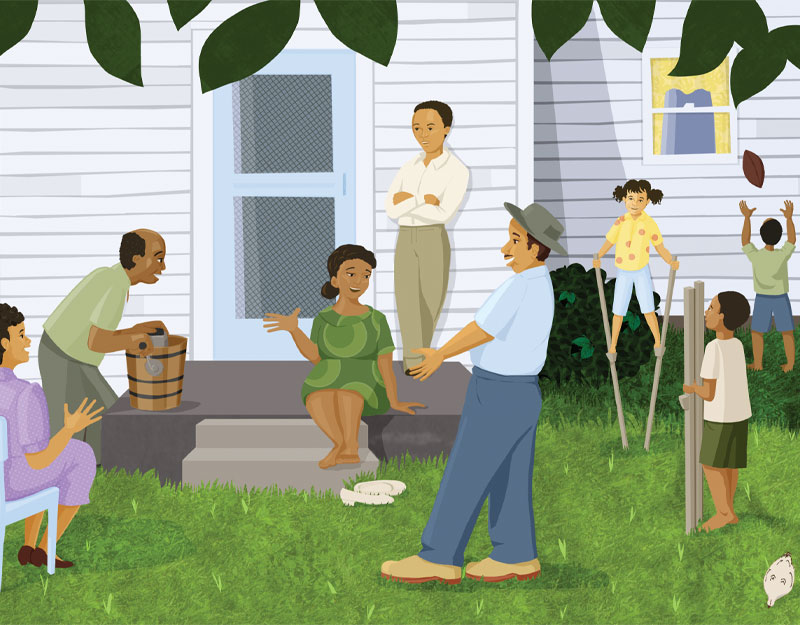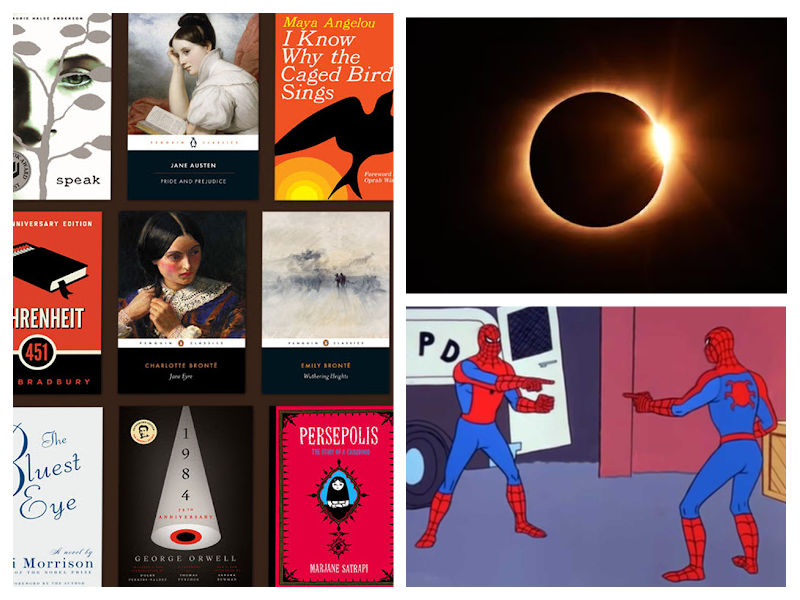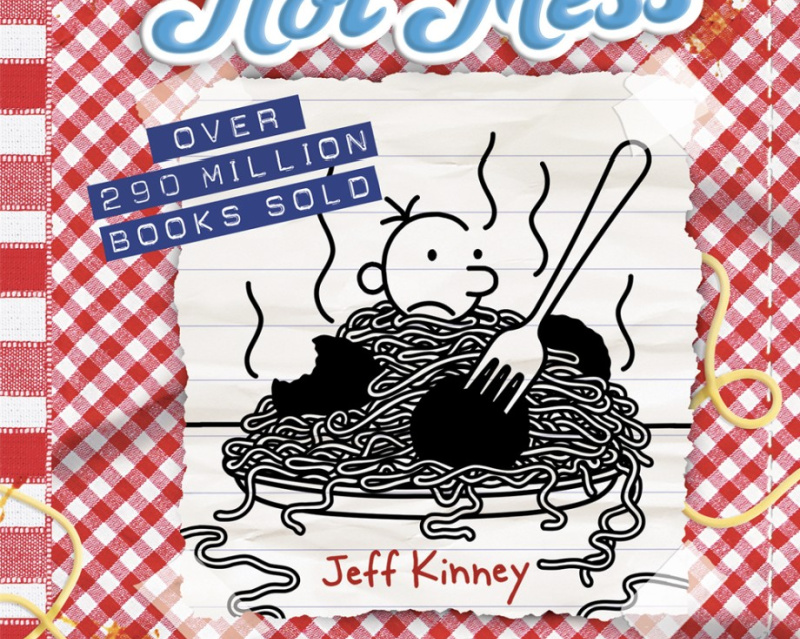Review of the Day: Louisiana’s Way Home by Kate DiCamillo
 Louisiana’s Way Home
Louisiana’s Way Home
By Kate DiCamillo
Candlewick Press
ISBN: 978-0-7636-9463-0
$16.99
Ages 9-12
On shelves October 2nd
There once was a book called Raymie Nightingale. Not a big flashy book with glitter on the cover and fonts that look like escaped balloon animals. Just a quiet book set in the late 1970s in Florida, patiently following various characters. Not a plot forward book, that one, though there was an interesting through line involving a cat. I liked Raymie Nightingale but I did have one small problem with it. While the character of Raymie was well drawn and nuanced, I wasn’t ever all that interested in her. You can slap someone’s name into the title all you want, but if that person has a friend like Louisiana Elefante waiting in the wings with a Granny that defies simple logic, your readers will naturally going to want to know about that person a bit more. Enter Louisiana’s Way Home. Rather than make her job easy for herself and simply place Louisiana in the company of pre-established characters, DiCamillo ups and moves the girl and her Granny to a Georgia motel, sans teeth (for one character, anyway). This means new characters. New settings. New plots. New problems. And, most important of all, new revelations. I liked Raymie Nightingale okay. I really really like Louisiana’s Way Home, a slim, handsome novel about grace.
When last we saw our heroine, Louisiana Elefante, surviving daughter of the Flying Elefantes, is in a car with her Granny leaving the state of Florida hell-for-leather with a curse floating over her head. Not that Granny tells Louisiana where they’re going when she packs the two of them away. For reasons known only to Granny they are Georgia bound, but plans are put a bit on hold when it turns out that the older woman needs to have all her teeth pulled and in a hurry. While her guardian recuperates, Louisiana gets to know the Good Night Sleep Tight Motel, the boy and his crow who hang near it, a stuffed alligator, an organist, a motel owner, and a minister. She arranges to sing to pay the bill for their stay and it might all have gone well had Granny not dropped the bombshell to beat all bombshells. Now Louisiana is more alone than she has ever been in her entire life and without a playbook to figure out what to do next. Happily, when your entire playbook has been wiped off the map, it can be the perfect time to start over entirely from scratch. Curse free.
ADVERTISEMENT
ADVERTISEMENT
I remember after reading Raymie Nightingale finding it an incredibly sad affair. Sad as a solitary sinkhole. Diving into its companion novel, I wondered if Louisiana’s Way Home was going to up the serotonin levels any, instead finding it sad in its own way. Yet where I’d been weighted down by Raymie, here I didn’t feel encumbered at all. I suppose this is because in this book DiCamillo never overwhelms the reader with more than they can handle. She essentially excels is in driving you to the precipice of childhood understanding. Her characters gaze down into that void of adult concerns that aren’t suppose to touch children (and do) and you stand there, toes gripping the edge, right alongside them. There’s single reason that explains why DiCamillo is as wildly popular as she is, but if I were to harbor a guess at one of the reasons I’d say it would have to be that she speaks their language and often treats their emotions with respect. It’s part of what makes considering her books as an adult so hard. I’m seeing what the child characters can’t see because of my age, and that’s blocking me from seeing the book as a kid would. That’s usually the problem with reviewing books for kids, but in this case of this particular author I think it’s even more difficult.
Sometimes in DiCamillo’s writing she’ll flit around the edges of magical realism without ever really falling in. About half a year ago I was listening to a critique of the Oscar Award winning film The Shape of Water on one of my favorite podcasts. In the midst of the discussion, one of the podcast hosts mentioned that what makes critiquing the film so difficult is the fact that it’s a fable. Therefore, any skepticism leveled at seeming plot holes is leveled by the simple declaration that “it’s a fable”. Now Louisiana’s Way Home is not a fable, but it may house some of the same bones. When I read the book it’s like I’m both seeing the scenes as they happen, and seeing them through a fog. I think that fog is my way of getting through Louisiana’s perceptions. It’s not something I remember feeling when I read her other books, but it definitely doesn’t detract from the reading experience.
In spite of the fact that this story is a companion novel, the book bears more similarities to one of her earlier works than Raymie Nightingale. Reading this story, I thought most of The Tiger Rising. I always knew that Florida was practically its own character in DiCamillo’s books, but I never realized that motels held almost equal sway. In this book the motel in question is the Good Night Sleep Tight. Once you’ve gotten past the black and red squares of shag (there’s some part of my soul cringing into a little rocking ball as I write that) and the stuffed alligator, it’s all about the woman behind the counter. Louisiana has spent time in many motels, and has vast motel-related experience. One gets the feeling that DiCamillo loves motels for what they can do for a story, but finds them harrowing places. They never seem to be run by anyone all that nice.
In an interview once, the cartoon creator Rebecca Sugar was asked if she believed that all people are redeemable. Speaking very carefully she referred back to her show Steven Universe, saying that she believed that no character on the show is beyond redemption. I bring this up because like Sugar, DiCamillo likes a little complexity with her baddies. And by “baddies” I don’t mean villains. She’s not averse to making a mustache twirling rotter from time to time, but on the whole she’s much more interested in people like Bernice, the motel owner. Folks who peer at the world through an us vs. them mentality and take pride in their abilities to withstand pity, sympathy, or compassion. I don’t think it’s a spoiler to say that Bernice doesn’t get redeemed by the end of this story, nor in all likelihood will she after the story’s done. But this is only because DiCamillo isn’t asking you to forgive Bernice here. It’s Granny who’s failed Louisiana the most. It’s Granny who needs that forgiveness.
Granny is the most frustrating character in the book in many ways. She just steadfastly refuses to slot neatly into a category. An adult reading this book would note pretty early on that it’s clear that Granny has been mentally ill for quite a while, but she is still the authority to be reckoned with here. There are times when she is mind-bendingly irresponsible, and times when she shows real care. Her confession to Louisiana is a game changer, but also makes her oddly sympathetic. Then again, she abandons someone who trusts her. She’s a great character. Heck, this thing is just rife with good characters. The minister is honest and unhelpful and helpful all at once. The Burke Allens act like they’ve stepped out of a play by Godot, saying the same things repeatedly but meaning something different each time. And then there’s Louisiana’s friend Burke himself. You might eye that supremely helpful crow boy and try to say that he’s a manic pixie dream character, but it isn’t true. Burke may help Louisiana a lot, but that’s because he’s an honestly nice guy. He is, as Louisiana herself says, “the kind of person who, if you asked him for one of something, gave you two instead.” So you can’t imagine my relief when I realized that he had his own life and his own problems to deal with. I mean, the kid keeps skipping school. That’s a problem. A good problem for a character with a good heart to have.
The riddle of this book for some will be whether or not it stands on its own. Do you need to know all the characters and plot twists in Raymie Nightingale to make sense of this book? Nope. I might not be the best person to judge since I’ve read it, but that was a long time ago and I have a creaky little brain that has difficulty remembering the names of my own children half the time, let alone books for kids I read years ago. That said, Raymie and friends are always on the edges of the narrative, threatening to plunge in like this book is a sinkhole and they’re deux ex machina-ing their way into it. Happily, DiCamillo keeps them at bay. I could have done without Louisiana thinking about them quite so much, but to be fair if she hadn’t then the ending of the book would have felt a bit random. So maybe we should say that you don’t have to have read Raymie Nightingale but if haven’t then you may have the nagging sense that there’s a piece to this puzzle that’s missing.
Early in this review I said this book is about grace. I don’t think that’s wrong. Broken down to its most essential elements, Louisiana is abandoned by someone she trusts, tries to work things out on her own, consults with a minister, and chooses forgiveness by the tale’s end. That’s grace, man. Best of all, the book’s not preaching to you. You take whatever DiCamillo is laying out and make your own conclusions. Burke’s grandfather puts this better than I do, of course: “Take what is offered to you.” And yes, it’s a sad one. Not a dead dog kind of sad. More an alone-in-the-universe sadness. All kids can relate to the fear of abandonment. Perhaps there’s a catharsis in seeing it happen to someone else. Whatever the case, it’s a smart little book that gets to the point after meandering through fifty others and you wouldn’t have it any other way. Do what the man says then. Take what is offered to you.
On shelves October 2nd.
Source: Galley sent from publisher for review.
Filed under: Best Books, Best Books of 2018, Reviews, Reviews 2018
About Betsy Bird
Betsy Bird is currently the Collection Development Manager of the Evanston Public Library system and a former Materials Specialist for New York Public Library. She has served on Newbery, written for Horn Book, and has done other lovely little things that she'd love to tell you about but that she's sure you'd find more interesting to hear of in person. Her opinions are her own and do not reflect those of EPL, SLJ, or any of the other acronyms you might be able to name. Follow her on Twitter: @fuseeight.
ADVERTISEMENT
ADVERTISEMENT
SLJ Blog Network
Happy Poem in Your Pocket Day!
More Geronimo Stilton Graphic Novels Coming from Papercutz | News
Parsing Religion in Public Schools
Environmental Mystery for Middle Grade Readers, a guest post by Rae Chalmers
ADVERTISEMENT








I was *not* a fan of Raymie Nightingale, especially because of the plot line with the cat. I won’t give spoilers for those who haven’t read it, but ever since I was a small child I’ve detested when an author assures the reader, repeatedly, that a thing is so and then suddenly, at the climax, says it isn’t. It’s done to create a Happy Ending. It’s not Magical Realism, it’s dishonest writing.
I’m afraid DiCamillo has become too much of a Brand for me. Lonely Child + Messed Up/Absent Parent/Adult + Magical Animal = Heart-Warming Story. Nopes. I’m eagerly awaiting Squirm by Carl Hiaasen instead. At least he doesn’t try to pass off his over-the-top Floridians as magical.
I feel like the “magical animals” in Raymie Nightingale and Louisiana’s Way Home are almost beside the point. I also think to write these books off as “heart-warming,” doesn’t do justice to what DiCamillo accomplishes in them. They both convey a child’s deep sense of loneliness, and eventually a way out of that loneliness through connection with other people. (Not to mention the sometimes pretty cutting humor she deploys.) This all means a lot to me as an adult, and I think would have been even more important to me had they been available to me when I was a kid.